With all 435 members of the U.S. House of Representatives up for reelection every two years, it can be hard to keep track of which races will have much of an environmental impact. Here’s a cheat sheet on some of the contests enviros are following most closely, based on the greenest (and least-green) candidates in the pool this year.
—–

Don Young.
Don Young, who’s represented Alaska in the House for nearly 36 years, maintains a lifetime score of just 9 percent from LCV, and has long been a thorn in the side of enviros. He’s been a leading proponent of opening up the Arctic National Wildlife Refuge to drilling, he’s tried to kill wind-farm plans, he’s even bashed bikes. He’s currently under investigation for his ties to the oil-field engineering firm VECO Corp., the same company whose gifts led to Alaskan Sen. Ted Stevens (R) being found guilty of corruption.
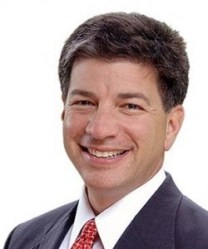
Ethan Berkowitz
The most recent polls show Berkowitz up by 8 points.Giving Young his toughest challenge yet is Anchorage Democrat Ethan Berkowitz. He hasn’t gotten any endorsements from big environmental groups, and, like pretty much every other Alaskan politician, he calls for more oil and gas drilling, but he’s also put forward plans to “use renewable resources like wind, geothermal and tidal so we can reduce energy bills across the state.” And even if enviros aren’t explicitly backing him, they’d love to see Young ousted.
—–
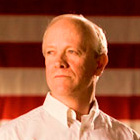
Jerry McNerney.
When Jerry McNerney, a wind energy consultant, defeated enviro foe Richard Pombo in 2006, enviros could barely contain their glee. McNerney has done fairly well by them in the House, earning an 85 percent from LCV in his first term as well as endorsements for reelection from LCV, the Sierra Club, and the National Wildlife Federation Action Fund.

Dean Andal.
This year, LCV has added his Republican opponent, Stockton developer and former state legislator Dean Andal, to its Dirty Dozen list, after he received a 9 percent lifetime score from the California League of Conservation Voters. Andal says he wants to see more domestic drilling, tax incentives for businesses that go green, and tougher efficiency standards for cars and trucks. But in state government, he’s opposed fuel-efficiency programs and measures to slow global warming, and voted to open up the state’s coast to drilling.
A recent poll shows McNerney up by 11 points.
—–
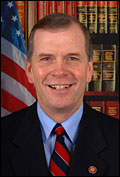
Tim Walberg.
Rep. Tim Walberg (R) managed to score a 3 percent from the League of Conservation Voters in his single term in office, voting against nearly every environmental measure, and for every measure to promote oil drilling and other fossil fuels. He even voted against the No Child Left Inside Act, a measure designed to help educate children about the natural environment.
Pollsters say the race is a toss-up at this point.His opponent this year is Democrat Mark Shauer, who is campaigning at least in part on a call for energy independence and green-collar jobs for Michigan. He’s called for ending tax breaks for Big Oil, curbing oil speculation, investing in renewable-energy technology, and protecting environmentally sensitive areas like the Great Lakes. He’s won endorsements from the Sierra Club and LCV.
—–
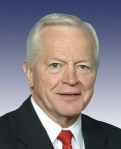
Joe Knollenberg.
Rep. Joe Knollenberg (R) managed to pull down a 24 percent from LCV for the 110th Congress, but his lifetime average remains a paltry 9 percent, landing him a spot on LCV’s Dirty Dozen list this year. He’s particularly irksome to enviros because he claims that “protecting, preserving, and providing for the health of our environment is one of his top priorities.”
“Who among us is not an environmentalist?” Knollenberg asked in a recent video. But he has voted against pretty much every measure that would protect the environment over his eight terms in the House. In 1998 and 1999, he attached what was known as the “Knollenberg amendment” to congressional budget appropriation bills, intending to prevent government agencies from regulating planet-warming emissions. A few years ago he even declared war on low-flow toilets.
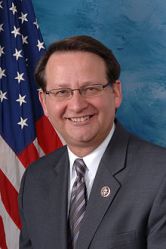
Gary Peters.
Recent polls find Knollenberg and Peters in a dead heat.His challenger, Democrat Gary Peters, is a state senator with a solid record on protecting the Great Lakes, including leading an effort to ban directional oil drilling under the lakes. His energy plan calls for reducing oil speculation and price gouging, and investing in green alternatives. LCV and Sierra Club have both endorsed Peters.
—–
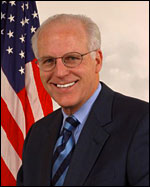
Christopher Shays.
Shays has earned a 90 percent lifetime average from LCV over his 22 years in office, though the last two years have shown quite a spread — he scored a 100 percent in 2007, and just a 54 percent this year. He’s been a key legislative ally for enviros over the years, cosponsoring the Energy for Our Future Act, which would set high auto fuel-economy standards, increase funding for renewable-energy R&D, and repeal tax breaks for oil companies. He also introduced the Clean Water Protection Act, cosponsored the Clean Smokestacks Act, and has been a leader in efforts to protect the Long Island Sound. Both the Sierra Club and LCV have endorsed him this year, and Republicans for Environmental Protection named him one of the “Greenest Republicans in Congress.”Republican Rep. Christopher Shays has long been a friend to enviros from the right side of the aisle, but he’s facing a tough challenge this year from Democrat Jim Himes. Recent polls show the race is too close to call at this point.
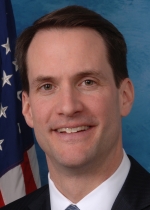
Jim Himes.
His challenger this year, Jim Himes, is a former vice president at Goldman Sachs and is now the VP of the nonprofit Enterprise Community Partners, where he’s worked to make affordable housing more energy efficient. He’s also been actively campaigning on his energy and environment plan, noting, “Either we will be the agents of a green revolution, or we will hand our children a mess they will not be able to fix.”Shays is seen as one of the most vulnerable Republicans in the Northeast, which has become increasingly Democratic in recent years. He barely squeezed out a win in 2006, a year when several other moderate Republicans fell victim to a Democratic tide.
—–
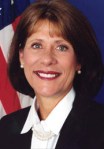
Anne Northup.
Former Rep. Anne Northup (R) lost this seat to Democrat John Yarmuth in 2006, after racking up a lifetime score of 7 percent from LCV over her 10 years in the House. She’s fighting to regain her seat this year, campaigning hardon a pro-drilling message.
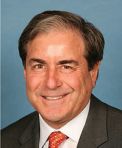
John Yarmuth.
Yarmuth is getting love from enviros in the race. He’s been endorsed by the Sierra Club and LCV, which gave him a 100 percent score for his first term. He was active on a variety of environmental issues, including mountaintop-removal mining, climate change, and clean water, and cosponsored the Clean Water Restoration Act of 2007.
Polls currently show Yarmuth with a 16-point lead.
—–
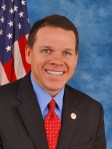
Sam Graves.
Rep. Sam Graves is another Dirty Dozen honoree. He earned a 6 percent score from LCV for the 110th Congress, and maintains a 4 percent lifetime average. In his three terms in office, he’s voted repeatedly against raising fuel-economy standards for automobiles and supporting renewable energy.

Kay Barnes.
Democratic challenger Kay Barnes, previously the mayor of Kansas City, has been critical of Graves on energy policy and says the country should expand its use of renewable energy sources. She’s been especially bullish on wind energy, which she believes has strong potential in the state. Barnes has been endorsed by LCV and the Sierra Club.
A recent poll found Graves with an 18-point lead.
—–
New Mexico District 1

Martin Heinrich.
Greens are excited about Martin Heinrich, a Democrat running to fill the House seat vacated by Rep. Heather Wilson, who made a failed bid for the Republican nomination to replace retiring Sen. Pete Domenici (R). Heinrich has served as the Albuquerque City Council president, and Gov. Bill Richardson (D) appointed him as the Natural Resources Trustee for the state. He’s also been the executive director of the Cottonwood Gulch Foundation, an organization dedicated to getting young people out into the wilderness. He’s bullish on the potential for renewable energy and energy efficiency, and advocates protecting wilderness areas in the state. He’s won endorsements from the National Wildlife Federation Action Fund, the Sierra Club, and LCV.

Darren White.
He’s running against Republican Darren White, who currently serves as the sheriff of Bernalillo County. His energy plan includes investment in renewables, more oversight in energy markets, and increased domestic drilling and use of nuclear power, natural gas, and “clean coal” technology.
Recent polls show a very tight race, with Heinrich currently up by 2 points.
—–

Mary Jo Kilroy.
Democrat Mary Jo Kilroy narrowly lost to incumbent Deborah Pryce in 2006; now, with Pryce retiring, she’s giving it another shot. Kilroy, the commissioner of Franklin County, is facing Republican Steve Stivers this year. The two have been running close; polls now show Kilroy up by six points.

Steve Stivers.
Kilroy has laid out a strong energy and climate plan, which she says would be a top priority for her if elected.
Stivers, a state legislator, also lists energy as a top concern, calling for increased domestic drilling and for $100 billion of the revenue generated from new offshore drilling to be invested in alternative energies.
—–
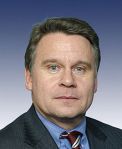
Chris Smith.
Republican Chris Smith earned LCV’s endorsement this year; the group gave him an 82 percent score for the 110th Congress and a 73 percent lifetime score. Smith also earned a 100 percent score from Republicans for Environmental Protection in 2007. He’s worked on climate change since the 1980s, including 2007 legislation to promote international cooperation on the issue.

Josh Zeitz.
The 28-year House veteran has won by major margins in recent years, but this time around his seat is looking more precarious by the day. He’s recently been caught up in a dispute about where exactly he lives, after claiming in-state tuition for his daughter in Virginia.
His challenger, Democrat Josh Zeitz, is a professor of American history. He calls for developing clean, alternative energy sources and increasing tax credits for fuel-efficient vehicles.
—–
Republican Rep. Mike Ferguson decided not to run for reelection this year, and the two candidates vying to replace him both have notable green credentials.

Linda Stender.
Democrat Linda Stender, a state assemblywoman, came close to winning the seat in 2006; this time she’s competing against state senator Leonard Lance.
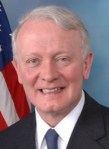
Leonard Lance.
The New York Times’ Green Inc. blog declared the race “too green to call”. The state Sierra Club chapter has declined to endorse because both have solid environmental records; likewise, LCV is staying neutral, after endorsing both candidates in their primary races. Stender was a lead sponsor of the state’s Global Warming Response Act, and Lance is active on land preservation.
—–
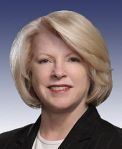
Marilyn Musgrave.
Enviros would like to see Republican Marilyn Musgrave unseated this year. She scored a 9 percent from LCV in the 110th Congress and has an 8 percent lifetime mark. She’s cosponsored a bill to promote coal gasification as an energy source for ethanol production, as well as a bill to make tax credits for ethanol and biodiesel permanent.

Betsy Markey.
Polls are showing a close race, one that’s gotten increasingly nasty.Her opponent this year, Democrat Betsy Markey, has won endorsements from LCV, the Sierra Club, and the National Wildlife Federation Action Fund. Markey’s been campaigning for land preservation and a clean-energy economy for the state. “We have a unique opportunity at this time in our history to change the way we power this country and Colorado is poised to become a world leader in this effort,” she says. “Our state’s wind, solar and agricultural energy supplies offer opportunities to create jobs, protect the environment, and decrease our dependence on foreign oil.”
—–

Michael Skelly.
Skelly has won the endorsement of the Sierra Club and LCV, while Culberson has managed to score a zero on the LCV scorecard for the past two years (he’s earned a 3 percent lifetime score).Michael Skelly, a Democrat currently on leave from his job as chief development officer at Horizon Wind Energy, is taking on Republican incumbent John Culberson.
Culberson has been an active oil advocate in the House, pushing for offshore drilling, drilling in ANWR, and oil-shale development. He calls for “alternative fuels such as clean nuclear power,” and says, “All environmental regulations should take into account a cost-benefit analysis.”
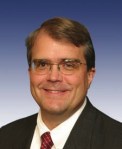
John Culberson.
Recent polls show that this is likely to be a close race.As a leader of the third-largest wind energy company in the country, Skelly is, of course, a big promoter of harnessing the wind. “With gas prices soaring, we are facing a serious energy crisis,” says his website. “But Washington is involved in a dialog of the deaf, with neither side capable of breaking through the partisan gridlock to adopt an energy policy that makes sense. It’s time we elect someone to Congress who understands the energy business well enough to know how our energy policy needs to be changed.” His plan calls for more renewables and improved energy efficiency, and as well as increased domestic drilling (he is in Texas, after all).


